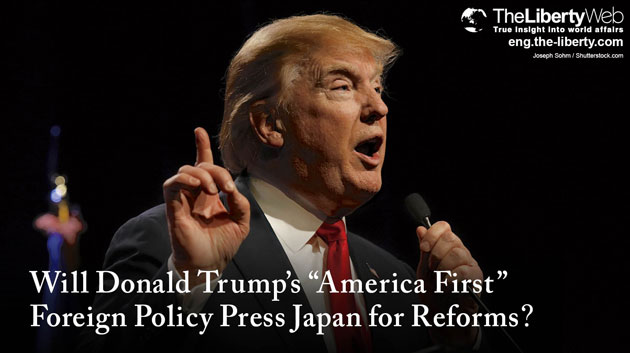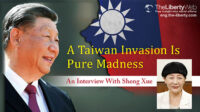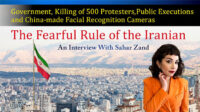Will Donald Trump’s “America First” Foreign Policy Press Japan for Reforms?
The presumptive Republican presidential nominee, Donald Trump, delivered a foreign policy speech in Washington D.C. on April 27th.
In the speech, he emphasized the phrase “America first” to describe his foreign policy vision. Simply stated, it means putting the national interests of America above all else. Those national interests mean protecting the well being of the people, so his “America first” foreign policy is not so uncommon. With the slogan of “America first,” he declared that he would make U.S. allies bear their fair share of financial burdens since the U.S. is plagued by budget deficits.
Will His “America First” Policy Be Favorable or a Burden to Japan?
Let us look at the content of his speech with explanation.
In his speech, he stated that only 4 of 28 member countries of NATO are spending the minimum required 2% of GDP on defense. He insisted that NATO allies must bear more of the burden financially, politically, and in personnel, and, if not, the U.S. must be prepared to let the countries bear more of the burden of defending themselves.
Japan is not a member of NATO, but it hosts many U.S. military bases. Some fear that Japan may be forced to bear the costs of its defense, but in some ways, this will be a chance for Japan to make a major change in its security policy and to establish an independent defense system that could include a nuclear arsenal.
Meanwhile, Trump stated that he would seek improved relations with Russia. This will represent a significant departure from the stance the Republican Party has traditionally adopted. This has already triggered criticism that this position represents a totally naïve foreign policy stance to think he can negotiation with Putin.
However, Trump’s willingness to improve ties with Russia is supposed to be good news for Japan, because it is highly likely that the formation of a coalition against China will be achieved if Russia leans toward America and Japan, and away from China.
America Is Going to Be a Reliable Friend and Ally
Next, let us look at Trump’s policy toward China.
Previously, he had touched upon the issue of unfair trade by China, but in this speech he went into depth in the area of foreign policy. While he vowed to seek better relations with China, he referred to the issue of China’s cyber attacks and clarified his position that China would not be allowed to seek maritime hegemony in the South China Sea. Also, he hinted at the possibility of breaking away from China if there is not resolution of some of these questionable issues with China.
Under the Obama administration, the U.S. has conducted a freedom of navigation operation in the South China Sea with due consideration to China. If Trump is elected president, his administration will deviate from the Obama policy toward China.
Trump also criticized Obama’s administration’s weak-kneed policy toward North Korea, saying that he would prod China to exert increasing pressure on North Korea. He stated that Iran could not be allowed to have a nuclear weapon. Furthermore, he mentioned that ISIS was making money selling Libyan oil, declaring his resolve to exterminate ISIS.
He also mentioned the need to rebuild the U.S. military. He said that he would not hesitate to deploy military force when there was no alternative, declaring that America was going to be strong and a reliable friend and ally again.
Some Criticize His Foreign Policy As Being Contradictory
The Trump’s foreign policy is not totally committed to interventionism or isolationism, so many have pointed out that his policy is full of contradictions. However, doesn’t it simply mean that Trump’s policy is difficult to understand when viewed from the rigid framework that the Republicans and the Democrats have traditionally maintained?
We are now entering a time of crisis. The qualities that are required of a leader at such times are obviously different from what is needed in times of peace. There is a call for president who is flexible enough to see the world with a new vision.
One of the frameworks that should be viewed in a new way is the Japan-U.S. alliance. As mentioned earlier, Trump insists that Japan pay its fair share of the costs of stationing the U.S. troops. The Japan-U.S. alliance obliges the U.S. to protect Japan, but Japan does not have to fight to defend the U.S., because Article 9 of the Constitution of Japan prohibits the country from fighting with the use of weapons.
Trump expressed his discontent saying that it is pretty one-sided agreement. If he becomes president, he will call for Japan to review the Japan-U.S. alliance, that is to say, to revise the Japan-U.S. Security Treaty, which will inevitably lead to the amendment to Article 9.
It is time for Japan to be prepared should Trump become president.
This represents a probable departure from foreign policy depending heavily on the U.S.
Japan must stop believing blindly that justice is always on the side of the U.S.
It is necessary for Japan to work toward creating a new world peace through efforts such as remonstrating the U.S. when it threatens to carry out an excessive foreign policy such as exterminating ISIS without exploring all alternatives for a solution. A new era is beginning when Japan should explore world justice as a nation. (Hanako Cho)



















